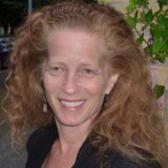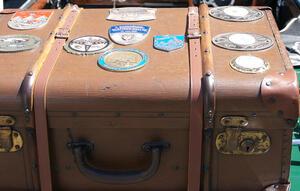Jewish Identity: A Round-Trip Journey
A life-long discomfort with institutionalized Judaism is hard to shed once you reach the mid-life years. Sure, it’s great to keep an open mind, but there’s also the sense of not wanting to waste time on pursuits unlikely to enrich one’s life. Some of us narrow our options as we get older in a bargain to reduce the odds of having regrets.
Years of involvement with synagogue life had left me without a strong Jewish identity. This could be my own fault for not making a large enough personal investment, at least that’s what our rabbi and congregation president hinted at when we recently decided not to renew our annual membership. What was it that held us back? Years of trying to fit in, find meaning in the services, and carve out time and money for the responsibilities of membership had left us feeling….well, unfulfilled.
But something shifted when we moved to Germany in July of 2010. The vague contours of my Jewish identity gradually took on a clear shape. This was not a transformation of faith, but rather a return to the embrace of German Jewish culture, to the memories of my childhood when I was surrounded by relatives who all spoke with the same New York German Jewish accent and whose lives were a story from a faraway place that I could only imagine.
In a place where Jewish life had been all but extinguished, our family took part in building a new Jewish presence on German soil. A void was filled as I attended services in Berlin among people who shared my ancestry and my determination to revive a part of what had been lost. The sense of connection to Jewish traditions and rituals was present for me in a way that it had never been in the States, at least not since I had left the East Coast at the age of eight to become a California transplant.
Back in the States we were part of the melting pot of Jewish America. Despite all the benefits that come from our diversity, there was also something missing that I had never before been able to put my finger on. In Germany I realized that the missing element was a common cultural heritage that connects us.
As assimilated Americans, we have Jewish identity issues that German Jews don't have. We come together to share Jewish rituals, but the feeling does not always or often run very deep. We remind ourselves that we come from a long historical tradition that must be kept alive, but we may not feel this in our bones. We worry about things like building funds and membership growth, but how do such pressures help build our Jewish identities?
It was the return to the States that cast a sharper light on the questions that I had struggled with for so long. The journey back to my roots had helped me to find the core of my Jewish identity, but the old doubts about how to lead a meaningful Jewish life resurfaced upon my return to Montana.
One of the first discussions I had with our rabbi after our return was about my daughter’s bat mitzvah. Olivia had been struggling for quite some time to decide if her coming of age ritual would be a bat mitzvah or something outside the Jewish faith. As I listened to the rabbi recite the long list of official guidelines, I was stunned to hear that she would be required to keep a punch card to mark her attendance at services. She would need to have ten punches on the card during the year leading up to her bat mitzvah, with no free coffee or hot chocolate to reward her at the end!
I'm troubled by the image of my daughter holding up her punch card to the rabbi after Friday night services. Would my daughter really be more Jewish when the card was full? If she learned her Torah portion and the requisite prayers, why couldn’t she carve her own path to her bat mitzvah and Jewish adulthood? Wouldn’t a single profound experience at services be worth more than half a dozen boring ones? Judaism in America feels formulaic at times and the punch card rule symbolized a structure within which I often feel more constrained than inspired.
The end of a journey can bring emotions that range from elation to relief, from fulfillment to exhaustion. I returned from Berlin enriched by my involvement in one of the smallest, but fastest growing Jewish communities in the world. But I also had renewed feelings of ambivalence and doubt about my connection to American Judaism. Now I must weave these two strands of my Jewish self into a single thread of my identity. And I must not abandon the effort to find community amidst the melting pot of Jews in America.








Interesting perspective but I can't help notice a bit of hypocrisy. For most of Jewish diaspora history, particularly in Europe, Jews have championed the idea of "diversity" and allowing and accepting anyone and everyone into which every country you lived, basically the way you describe America and it's Jewish community. However, you said that through this lack of a common heritage threatened your identity (and, in my opinion, your feelings of self-worth). So, you left a society of inclusion in order to live in a more exclusive society. Notice the hypocrisy? Jews, in order to be accepted in whichever country they lived, tried to influence their host nation to be more inclusive and when those in the host nation felt their ethnic identity was threatened, some went to the extreme to oppose it (Nazis and many others). Now, it seems, you want the exact same thing and for the same reason. Must escape the multi-cultural Jewish (and America) community for the exclusive one of Germany. Ask yourself why. Once you know the answer, you'll have a better understanding as to why native Europeans have historically opposed Jews.
Dear Donna, I too read your article with interest. I also agree with the previous commentator. There have been times when I've felt more and less connected depending on what was going on in my life. I see the reform and conservative movements as broadening rather than narrow. The torah, even when seen as metaphor provides lessons for living. you need an inspiring rabbi and perhaps openness to see that. i agree that your daughters punch card was ridiculous, but a bat mitzvah is also an honor. I'm glad you were able to reconnect in Germany.
Although I can see why a congregation might feel a need for such a system and can even follow the ratiocination that got them there, I gotta say that not all congregations are like that. I know that it wasn't the case at the congregation where my kids got bar mitzvahed (because at that congregation they weren't much into attending services), nor is it true at the congregation where my wife and I as empty nesters have been attending in our own occasional way (which, as it happens, our kids also enjoy attending when in town).
So, the message here may be that there is diversity not just in Jewish ritual, but in ways that people see themselves as part of that ritual (or try to force others to participate in same). Time to check out other congregations in your area, or perhaps even get together with some like-minded friends and start your own (or do as friends of mine did who started a chavurah, a smaller, less formal meeting).
Your essay really spoke to me. I think the last time I put foot in a shul was when my father died and I wanted to say yahrzeit on the high holy days. I had never been religious, but I was hoping that performing a ritual in a communal setting would be a spiritual experience.
Because I wasn't a member of the congregation, and didn't want to pay a fee, I wasn't made to feel welcome, however. And so I've been disaffected from Judaism as a practice for several decades. It's easy to be Jewish without being spiritual in New York city, where I grew up, and I just got out of the habit of thinking about religion when I moved to Arizona.
Recently, however, I started writing about my mother's family in Vienna. It didn't make me more observant, but it did make me connect with the idea of Judaism as a matter of life and death, whether you choose to observe or not. That's certainly different from the typical American experience -- as you describe it so well.
In reply to <p>Your essay really spoke to by Edie
Dear Edie, Thanks so much for your comments. One difficulty that I had in writing this piece was that I did not want to sound too negative. Yet years of frustration with synagogue life, combined with such a contrasting experience in Germany, compelled me to express my views. It is also challenging as a parent to know how best to help guide the religious choices of my children. Our family currently enjoys celebrating Jewish holidays and rituals at home but we have not abandoned the quest for community either.